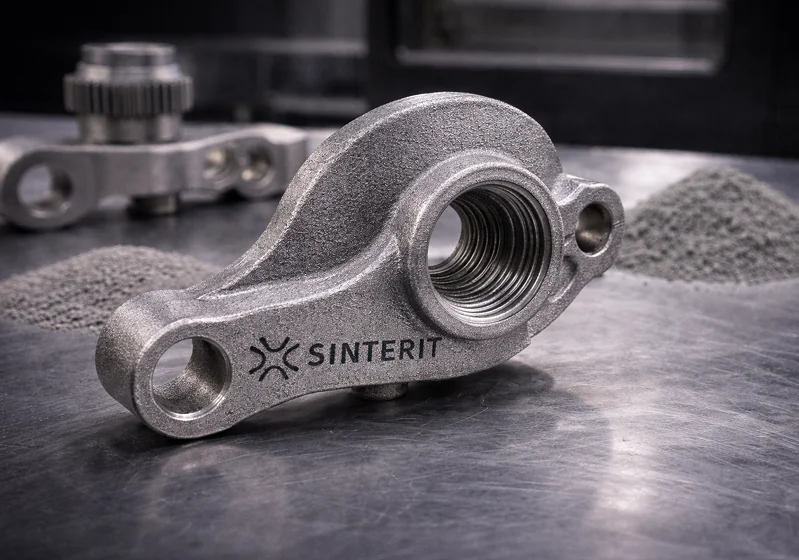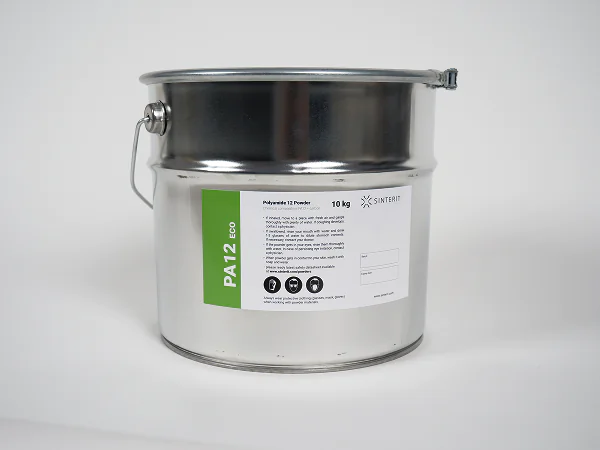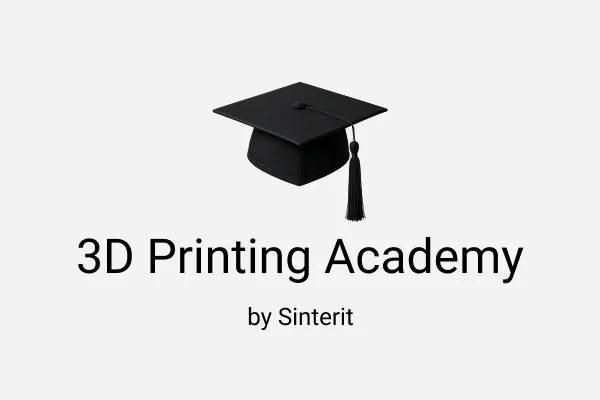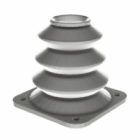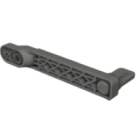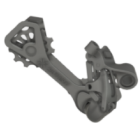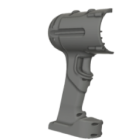Giving powder a second life: how to reuse MJF PA12 in SLS printing on Lisa X
As the 3D printing industry continues to mature, sustainable practices are gaining momentum across all sectors. Among these, the reuse of powdered materials from Multi Jet Fusion (MJF) technology in Selective Laser Sintering (SLS) processes stands out as a promising approach to reduce waste and cost while maintaining high print quality. This article delves into the process and advantages of reusing HP’s used PA12 powder from MJF machines in the SLS process on Sinterit’s Lisa X printer.
The context: why reuse MJF powder?
Multi Jet Fusion, developed by HP, is a high-speed powder-based 3D printing technology popular in industrial applications for its speed, detail, and mechanical properties. However, not all powder is fused in each print job. While HP promotes the use of their “High Reusability PA12” line, in practice, even reusability comes with limits.
Typically, only a portion of the powder can be reused directly in subsequent MJF prints. The rest — known as “used” or “spent” powder — often gets discarded, despite still having viable thermal and flow characteristics. Enter SLS printing: particularly with open-platform systems like the Sinterit Lisa X, this leftover powder can be given a second life.
Compatibility considerations
Before diving into the reuse process, it’s critical to understand which HP powders are compatible with this method. Not all MJF powders are suitable for reuse in SLS.
✅ Compatible powders:
- HP 3D High Reusability PA 12 (for Jet Fusion 4200/5200)
- HP 3D High Reusability CB PA 12 (for Jet Fusion 500/300)
❌ Not compatible:
- HP 3D High Reusability PA 12 W39 (for Jet Fusion 5420)
How the conditioning process works
Used PA12 powder from HP’s Multi Jet Fusion process can be effectively refreshed for SLS printing on the Lisa X through a precise and controlled mixing process. The procedure begins by measuring out 8 kilograms of used powder and blending it with 56 grams of a carbon additive to restore flowability and thermal consistency. A small portion of the powder (2 kg) is first sifted together with the carbon to create a uniform premix, which is then blended thoroughly. This premix is combined with the remaining 6 kilograms of powder, sifted beforehand to ensure consistency, and mixed in a high-speed powder mixer for an hour. Afterwards, the entire batch is sifted again and given a final 15-minute blend to achieve optimal homogeneity. Once ready, the refreshed powder is stored in sealed polyethene-lined buckets to protect it from moisture and contamination.

Benefits of reusing MJF powder in SLS
1. Cost efficiency
Virgin PA12 powder for SLS or MJF is costly. By repurposing leftover MJF powder that would otherwise be discarded, companies can save significantly on material costs. Even factoring in the additive and energy for mixing, the overall cost per kg drops considerably.
2. Waste reduction
The additive manufacturing sector often faces criticism over material waste. MJF printing typically produces 60-80% unused powder per build. Reclaiming this material for SLS applications allows companies to move toward a zero-waste workflow — critical for meeting environmental goals and sustainability certifications.
3. Cross-technology synergy
Repurposing materials between MJF and SLS shows how different technologies can complement rather than compete. This interoperability is especially valuable in environments that operate both MJF and SLS printers — allowing for more flexible resource allocation and better ROI from materials.
4. Reliable performance on Lisa X
The Lisa X’s robust open-material system and precise control parameters make it highly compatible with custom or reused powders. With proper mixing and storage, prints made using reprocessed HP PA12 demonstrate excellent mechanical strength, dimensional accuracy, and surface finish — comparable to prints made with fresh SLS powder.
5. Environmental responsibility
Adopting reuse protocols like this one reflects well on a company’s corporate social responsibility (CSR) posture. Customers, investors, and regulators increasingly expect manufacturers to optimize resource use. Promoting internal reuse processes sends a strong sustainability signal.
Tips for best results
- Monitor powder aging: even with additives, reused powder won’t last forever. Track the number of cycles and printing performance over time.
- Control humidity: store powder in a dry environment below 20% relative humidity, ideally with silica desiccants.
- Perform print tests: before switching to full production runs, print small calibration parts to verify behaviour.
- Keep batches consistent: mixing multiple sources of used powder may introduce unpredictable results; use single-source batches where possible.

Final thoughts
The Lisa X offers a rare combination of power, flexibility, and openness that unlocks the potential of used MJF powder. Through a carefully structured mixing and preparation process, materials that once had a single-use lifecycle can now be part of a more circular, efficient 3D printing workflow.
As additive manufacturing evolves, material reuse strategies like this one will play a central role in shaping a more cost-effective and environmentally responsible future. If your company operates both MJF and SLS printers, don’t let your used PA12 go to waste—give it new life in the Lisa X.
FAQ: reusing MJF PA12 Powder in SLS Printing with Lisa X
Yes. Used PA12 powder from HP’s Multi Jet Fusion (MJF) process can be successfully reused in Selective Laser Sintering (SLS) printing when properly conditioned. This approach reduces waste and lowers material costs without compromising print quality.
Only specific types of HP PA12 powder are compatible with reuse in SLS printing on the Lisa X. The compatible types include: HP 3D High Reusability PA12 (used in Jet Fusion 4200/5200) and HP 3D High Reusability CB PA12 (used in Jet Fusion 500/300). Powders such as HP 3D High Reusability PA12 W39 (used in Jet Fusion 5420) are not compatible.
Conditioning involves mixing 8 kg of used PA12 powder with 56 grams of a carbon additive to restore flowability and thermal performance. The process includes sifting, pre-mixing, high-speed blending, and final homogenization before storage in moisture-proof containers.
No. When conditioned correctly, reused HP PA12 powder produces high-quality prints on the Lisa X with excellent mechanical strength, dimensional accuracy, and surface finish—comparable to those made with virgin SLS powder.
Reusing MJF PA12 powder significantly reduces material costs. While virgin PA12 is expensive, repurposing leftover powder—along with a small amount of additive—provides substantial savings per kilogram without sacrificing performance.
Mixing powders from different machines or build jobs is not recommended. Combining sources can cause inconsistencies in material behavior, leading to unpredictable printing results. Single-source batches ensure better reliability and consistency.
Conditioned powder should be stored in sealed, polyethylene-lined containers with desiccants. Maintaining humidity below 20% is crucial to preserving powder quality and preventing moisture-related printing issues.
There is no fixed limit, but the performance of reused powder declines with each cycle. It’s important to track usage and printing results over time. Regular calibration prints help determine when the powder should be retired.
The described reuse protocol is optimized for the Lisa X due to its open-material architecture. Other open-platform SLS printers may support similar reuse workflows, but closed systems may not accept non-certified materials or allow for parameter customization.
Reusing MJF PA12 powder significantly reduces industrial waste and extends the material lifecycle. This supports circular economy practices and helps companies align with sustainability goals and environmental standards.
Learn more about calculating the cost of conditioning used MJF powder for SLS printing on Lisa X.

